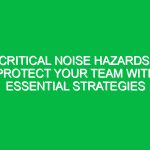Welcome to Our Toolbox Talk
Hello team! Today, we’re coming together for a crucial toolbox talk focused on a topic that affects our health, safety, and overall productivity—sleep. We often overlook the importance of sleep in our daily lives, but it plays a vital role in our ability to perform safely and efficiently at work. Let’s dive into why prioritizing sleep is essential for not just your personal well-being, but also for maintaining a safe working Environment.
Why Is Sleep Important for Workplace Safety?
Sleep is the body’s natural way of repairing and rejuvenating itself. According to the Centers for Disease Control and Prevention (CDC), inadequate sleep can lead to numerous health issues, including increased risk of chronic conditions, impaired cognitive function, and, importantly for our work, decreased alertness and focus. When we lack sufficient sleep, our reaction times slow down, decision-making skills deteriorate, and we become more prone to accidents.
Have you ever found yourself nodding off during a meeting or struggling to concentrate on a task? This is a common scenario resulting from insufficient sleep. When you are sleep-deprived, you are not only endangering yourself but also your coworkers. A lack of sleep can lead to costly mistakes, injuries, and even fatalities on the job. It is crucial to understand that ensuring adequate sleep is part of our responsibility to ourselves and our team.
The Science Behind Sleep and Health
Understanding the science behind sleep can help us appreciate its importance better. Our sleep cycle consists of several stages, including REM (Rapid Eye Movement) and non-REM sleep, each playing a unique role in physical health, mental clarity, and emotional stability. During sleep, our bodies undergo various processes:
- Physical Repair: Muscle growth, tissue repair, and protein synthesis occur during deep sleep.
- Mental Processing: REM sleep is critical for cognitive functions like memory consolidation and learning.
- Emotional Regulation: Adequate sleep helps us manage stress and maintain emotional balance.
When we don’t get enough sleep, these processes are disrupted. This not only impacts our health but also our ability to perform tasks safely and effectively. Think about it: how can you make sound decisions or react quickly in an emergency if your mind is foggy from lack of sleep? We need to prioritize sleep to ensure we are at our best while on the job.
Potential Hazards of Sleep Deprivation
Sleep deprivation can lead to several Hazards at work, which we must be aware of:
- Increased Errors: Sleep-deprived individuals are more likely to make mistakes, which can lead to accidents.
- Reduced Reaction Time: Slower response times can exacerbate dangerous situations.
- Health Risks: Chronic sleep deprivation can lead to health issues such as heart disease and diabetes, resulting in increased absenteeism.
- Impaired Judgment: A lack of sleep can lead to poor decision-making skills, affecting Safety protocols.
To illustrate, consider a scenario where an employee is operating heavy machinery. If they’ve had insufficient sleep, their ability to operate that machinery safely is compromised. This could lead to an accident not only affecting them but also others around them. Recognizing these risks emphasizes the need for adequate sleep as a fundamental aspect of Workplace Health and Safety.
Best Practices for Improving Sleep
Now that we understand the importance of sleep and the hazards associated with its deprivation, let’s discuss some practical tips for improving your sleep quality:
1. Establish a Sleep Routine
Try to go to bed and wake up at the same time every day, even on weekends. This consistency can help regulate your body’s internal clock, making it easier to fall asleep and wake up refreshed.
2. Create a Restful Environment
Your sleep environment matters. Make your bedroom conducive to sleep by keeping it dark, quiet, and cool. Consider using blackout curtains, earplugs, or a white noise machine to enhance your sleep quality.
3. Limit Screen Time Before Bed
Blue light emitted by screens can interfere with your ability to fall asleep. Try to avoid electronic devices at least an hour before bedtime. Instead, engage in calming activities like reading or taking a warm bath.
4. Watch Your Diet
Be mindful of what you consume, especially in the hours leading up to bedtime. Avoid caffeine and heavy meals before sleep. Instead, consider a light snack if you’re hungry.
5. Incorporate Physical Activity
Regular physical activity can help you fall asleep faster and enjoy deeper sleep. However, try to avoid vigorous exercise right before bedtime, as it might have the opposite effect.
6. Manage Stress
High stress levels can hinder your ability to sleep well. Consider incorporating relaxation techniques such as deep breathing, meditation, or gentle yoga into your evening routine.
Real-Life Examples and Scenarios
Let’s take a moment to reflect on some real-life situations that illustrate the impact of sleep on Workplace Safety:
Example 1: The Importance of Napping
Imagine a truck driver who has been on the road for several hours. Feeling fatigued, they pull over for a quick nap. After 20 minutes of sleep, they wake up refreshed and alert, allowing them to continue their journey safely. In contrast, a driver who ignores their fatigue may fall asleep at the wheel, resulting in a catastrophic accident.
Example 2: Shift Work and Sleep
Consider a healthcare worker on a night shift. They may face challenges in getting enough quality sleep during the day. By creating a dark and quiet environment with blackout curtains and a sleep mask, they can improve their sleep quality, which in turn enhances their ability to provide safe and effective care.
Open Discussion: Your Experiences with Sleep
I’d like to open the floor for discussion. Have any of you experienced challenges related to sleep at work? What strategies have you found helpful in ensuring you get enough rest? Sharing our experiences can help us learn from one another and promote a culture of safety around sleep.
Regulations and Standards Related to Sleep
While there may not be specific Regulations directly addressing sleep, several Workplace Safety standards emphasize the importance of employee health and well-being. The Occupational Safety and Health Administration (OSHA) encourages employers to implement programs that promote a healthy workforce, which includes addressing sleep issues. By recognizing the role of sleep in overall health, organizations can comply with broader health and safety standards.
Conclusion
In conclusion, sleep is a crucial component of workplace health and safety. By understanding its importance, recognizing the hazards of sleep deprivation, and implementing Best Practices for improving sleep quality, we can each contribute to a safer work environment. Let’s commit to prioritizing our sleep and, in turn, enhance our performance and safety on the job.
Thank you all for your attention and for your commitment to maintaining a safe workplace. Remember, a well-rested team is a safe and productive team!


